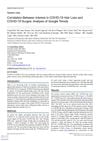 December 2023 in “International Journal of Biomedicine”
December 2023 in “International Journal of Biomedicine” Topical finasteride might help with male hair loss with fewer side effects than pills, but more research is needed.
 December 2023 in “Y Dược học”
December 2023 in “Y Dược học” Older adults in Vietnam often experience hair loss after COVID-19, especially women, singles, and those hospitalized.
 October 2023 in “Dermatology practical & conceptual”
October 2023 in “Dermatology practical & conceptual” Many patients experienced hair loss after COVID-19, with women affected more, starting on average 49 days post-infection.
[object Object]  September 2023 in “International journal of Unani and integrative medicine”
September 2023 in “International journal of Unani and integrative medicine” Hair loss patterns are linked to temperament and can help diagnose it.
 November 2019 in “Harper's Textbook of Pediatric Dermatology”
November 2019 in “Harper's Textbook of Pediatric Dermatology” Understanding normal hair growth and loss in children is key to diagnosing and treating hair disorders.

The document concludes that diagnosing female hair loss requires careful examination, with treatments varying by condition and psychological support often necessary.
 January 2019 in “Elsevier eBooks”
January 2019 in “Elsevier eBooks” Different hair disorders have specific treatments and outcomes, with some resolving on their own and others requiring medication or emotional support.
 July 2018 in “Elsevier eBooks”
July 2018 in “Elsevier eBooks” Some drugs can cause reversible hair loss, but certain chemotherapy drugs may lead to permanent hair loss; drugs can also change hair color and texture.

Modern hair restoration techniques can effectively treat hair loss and provide natural-looking results.
 January 2015 in “Springer eBooks”
January 2015 in “Springer eBooks” Hair damage shows as fragility, dullness, and discoloration, varies by ethnicity, and is worsened by cosmetic procedures and diseases.
 March 2012 in “EFSA Journal”
March 2012 in “EFSA Journal” Iron intake has not been proven to maintain normal hair growth.
 June 2011 in “The Journal for Nurse Practitioners”
June 2011 in “The Journal for Nurse Practitioners” Up to half of adult women may experience hair loss, and doctors should use medical history, exams, and tests to find the cause and treat it.
 January 2011 in “Springer eBooks”
January 2011 in “Springer eBooks” Eating a balanced diet with the right vitamins and minerals is important for healthy hair, but too many supplements can be harmful.
 September 2003 in “Current Paediatrics”
September 2003 in “Current Paediatrics” The document concludes that accurate diagnosis and understanding the type of hair disorder are crucial for treating hair loss in children.
 August 2024 in “International Journal of Basic & Clinical Pharmacology”
August 2024 in “International Journal of Basic & Clinical Pharmacology” Secretome-based therapies could improve hair growth better than current treatments.
 June 2024 in “International Journal for Research in Applied Science and Engineering Technology”
June 2024 in “International Journal for Research in Applied Science and Engineering Technology” Flaxseed hair gel is effective for hair growth and dandruff, is stable, and has minimal side effects.
 June 2024 in “Sohag Medical Journal”
June 2024 in “Sohag Medical Journal” Vitamin D is linked to hair health, but more research is needed for its use in treating female hair loss.
 April 2024 in “International journal of clinical trials”
April 2024 in “International journal of clinical trials” SesZen-Bio™ improves hair density, thickness, and overall hair health.

Abemaciclib can cause skin, hair, and nail problems, leading some patients to stop using it.
[object Object]  February 2024 in “Biomedical materials”
February 2024 in “Biomedical materials” Scientists created a lab-grown hair follicle model that behaves like real hair and could improve hair loss treatment research.
 January 2024 in “Clinical dermatology open access journal”
January 2024 in “Clinical dermatology open access journal” Hemp-derived cannabinoids can benefit skin and hair without causing a high.
 December 2023 in “International journal of research in dermatology”
December 2023 in “International journal of research in dermatology” The ayurvedic hair oil is safe and effective for reducing hair fall, promoting hair growth, and improving scalp health.
 November 2023 in “Frontiers in veterinary science”
November 2023 in “Frontiers in veterinary science” The study provides insights into hair growth mechanisms in yaks.
 November 2023 in “Frontiers in cell and developmental biology”
November 2023 in “Frontiers in cell and developmental biology” Hair aging is caused by stress, hormones, inflammation, and DNA damage affecting hair growth and color.
 October 2023 in “Al-Anbar medical journal”
October 2023 in “Al-Anbar medical journal” The clinic-based hair fall count method is accurate and reliable.
 September 2023 in “Dermatology and therapy”
September 2023 in “Dermatology and therapy” Ritlecitinib effectively improves hair growth in alopecia areata patients, regardless of hair loss pattern.

Interest in COVID-19 hair loss increased during COVID-19 surges, especially in higher-income countries.
 January 2022 in “Clinical dermatology open access journal”
January 2022 in “Clinical dermatology open access journal” Certain cannabinoids may help increase hair growth and could be useful for treating hair loss.
 November 2019 in “Journal of Aesthetic Nursing”
November 2019 in “Journal of Aesthetic Nursing” The article concludes that a thorough diagnosis and treatment plan, including medications, non-invasive methods, or surgery, is important for managing hair loss, with a combination of minoxidil and finasteride being particularly effective.
 December 2018 in “Esperienze dermatologiche”
December 2018 in “Esperienze dermatologiche” A lotion with Centella asiatica extract reduced hair loss by 41% and increased hair strength without side effects.






























